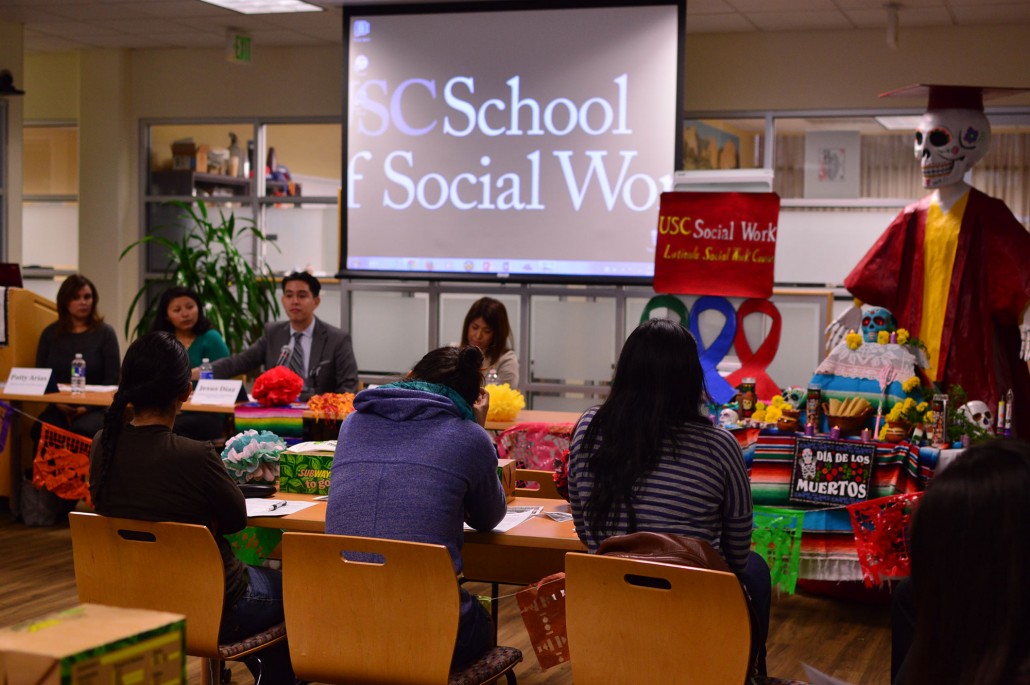Event focuses on Latino community health

Day of the Dead · The Latino Social Worker Caucus’s annual Dia de Los Muertos event centered around health issues facing the Latino community and ways that social workers can engage with members to build trust. – Iselin Arias | Daily Trojan
Before a room full of silent students, alumnus Martin Lopez Jr. blew four long, somber notes on a conch shell cupped in his hands. The sound signaled the start of the Latino/a Social Worker Caucus’s annual Dia De Los Muertos event, which took place Tuesday afternoon. The event focused on the disparity of health in the Latino community.
Lopez started the event with several traditional songs and explained the importance of connecting with the traditions of Latino heritage. He told the history of Dia De Los Muertos, a traditional Hispanic holiday celebrating the dead which is an integral part of Mexican culture.
After Lopez finished, student organization representative Iselin Arias introduced a panel of three speakers who specialize in the intersection between health and the Latino community. The panel included Patty Arias, a health specialist for the Pasitos Program; Jesus Diaz, a representative for California State Senator Ricardo Lara; and Lourdes Olivares, director of Behavioral Health at Bienvenidos Health Center.
Arias spoke about health concerns in the southeast Los Angeles community, where the Pasitos Program provides health care support and education to 500 children and their families. She said that in southeast Los Angeles, 97 percent of the population is Latino or Hispanic. Fifty percent of the children in that population are obese or overweight, and many more lack proper oral care.
The main concern that Arias noted is a lack of education in the low-income Latino communities that she interacts with. This ranges from uncertainty about how to take prescriptions to refusal to seek oral care. The Pasitos Program focuses on the education of both children and parents to combat this problem. Children learn how to develop habits such as brushing their teeth, while parents learn how to read nutrition labels, cook traditional meals in healthier ways and adjust daily eating and drinking patterns.
“Many parents aren’t aware why their child is overweight because they’re doing what they feel is proper,” Arias said. “That’s where we see a pattern, and that’s what we’re trying to fix.”
After Arias, Diaz spoke about the recent policies of State Sen. Ricardo Lara, who represents southeast Los Angeles and recently passed the “Health For All” act, which expands health care coverage to undocumented children in California. Diaz said that the senator saw a need for this bill after President Obama’s Affordable Care Act in 2010 did not offer coverage to undocumented immigrants.
Diaz said that the bill originally offered coverage to all undocumented immigrants, which Gov. Jerry Brown refused to accept. Lara and Brown compromised by providing coverage to the 170,000 undocumented children in California, which will create a $40 million increase in yearly Medi-Cal expenditures. Diaz said that the senator hopes to create further legislation that will expand this coverage to all undocumented immigrants. Diaz hopes that this effort will help undocumented immigrants build trust with their elected officials.
“These communities have been held in the shadows for a long time,” Lara said. “They’re very wary of government policies and elected officials. We need to make sure our families, our children and our communities know that not all politicians are bad politicians.”
Continuing with this theme of trust, Olivares spoke about the need for undocumented immigrants to seek medical care before it becomes an emergency. She pointed out that many undocumented immigrants will refuse to see a doctor until health problems become chronic. This is a pattern that she hopes to change at her center, which works to pre-screen and educate both documented and undocumented members of the Latino community.
“We must demystify the fear of going to the doctor,” Olivares said. “They won’t go because they’re undocumented, because they’re afraid they’ll call [immigration]. And that just doesn’t work, it isn’t safe.”
Olivares also focuses on treating mental health. She stressed the importance of social workers in this field. When a patient at her center is referred from a medical doctor to a mental health specialist, a social worker guides that patient through necessary and difficult steps toward treatment. Olivares also stressed the importance of Latino students remaining bilingual, as the increase for social workers fluent in Spanish and English increases.
“If you’re rusty on your Spanish, practice it at home,” Olivares said. “You are golden in these opportunities if you can relate to these people in their own language.”
At the conclusion of the event, each of the panelists received questions about a variety of topics — ranging from tips on choosing a specialty to advice on how to find care for an undocumented father — from the students in the room. Each of the panelists continued to stress the importance of focusing on the intersection between the Latino community and the health care industry, an intersection that each felt is both vital to the community and often overlooked.
